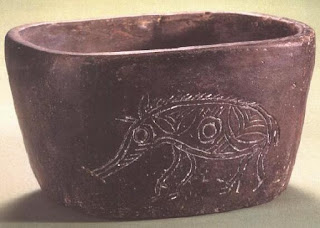A Day in the Life in 5000 B.C.
Hemudu (河姆渡) Culture dates back to around 5000 B.C. to 4000 B.C. It originated in areas near present day Hangzhou in Zhejiang Province on the southeast coast of China (Check HERE for the geographical location of Hangzhou). The Hemudu relic site was one of the most prominent archeological discoveries in China. It proves the Neolithic culture was also present in south China. What's it like for people living in Hemudu?
Hemudu people were natural architects. They designed and built their houses on stilts to adapt to their local living environment with plenty of rivers, lakes and ponds and associated humidity and floods. They also invented the mortise-tenon structure to combine two pieces of wood and widely used it in building their houses.
The picture below shows a black pottery with a carved image of a swine.
Here is another representative art work with a totem-like symbol from Hemudu. It was probably made for pure decoration purposes.
Hemudu people loved using colors. The Hemudu relics unearthed the earliest known lacquer object, a red wooden bowl.
Hemudu people were also known for their advanced spinning and weaving techniques. Archeologists have excavated spinning wheels and bone needles from the Hemudu relics.
With all these legacies from the Hemudu people, their whereabouts after 4000 B.C. remains a mystery.
-------------------------------------------------------------------------------------------------------------------------
Please leave any comments or suggestions below. If you are shy of doing so, we can always be reached at ourlittlegallery2018@gmail.com. We'd love to hear from you!









mencesta-ru Sheila Moore https://wakelet.com/wake/AIsjNVr1SgxDb8GVm-vax
ReplyDeletepernewgbehndiss